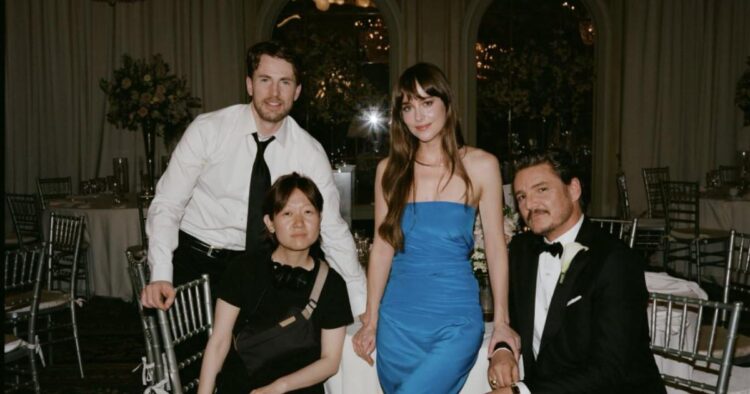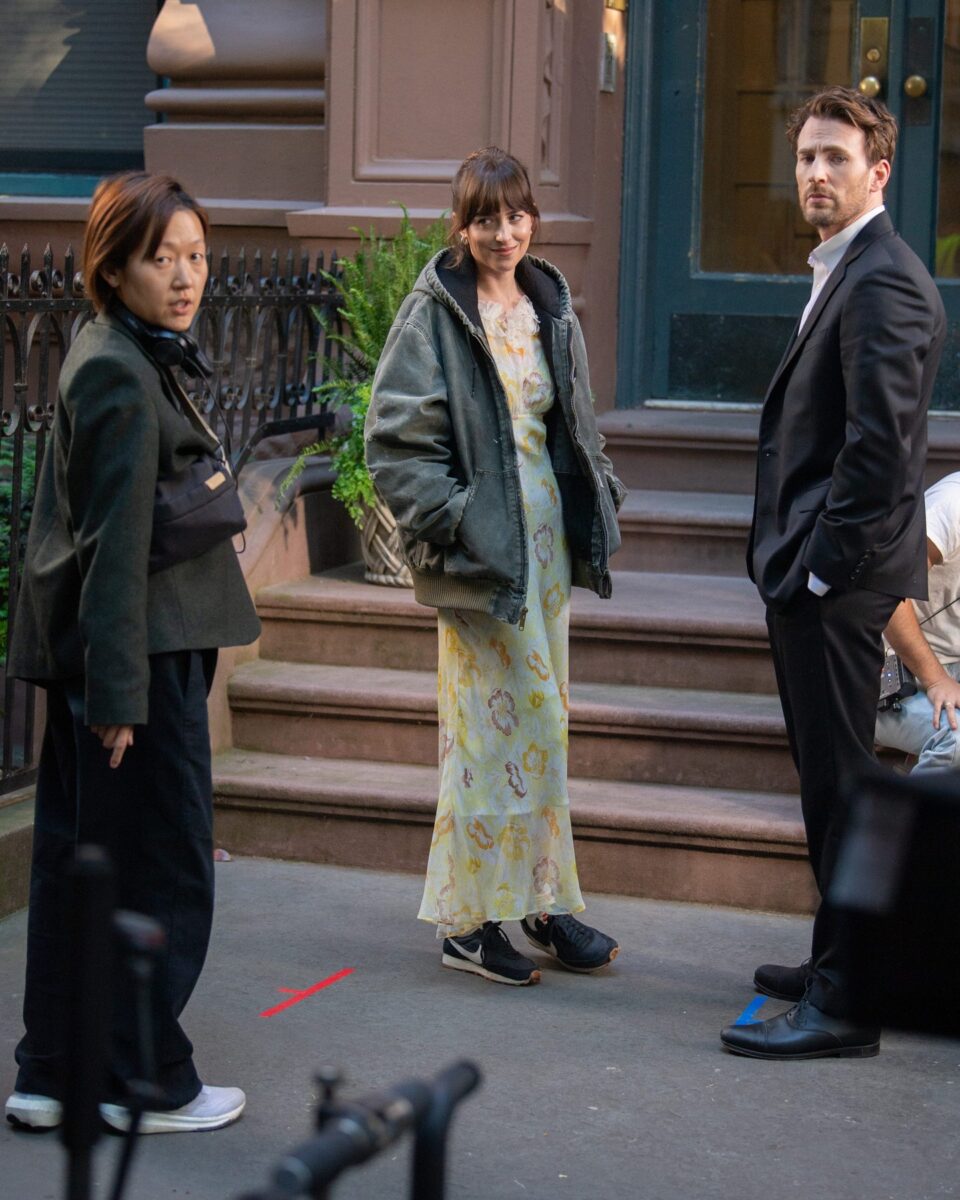
Love is a commodity in Materialists, the second feature from Past Lives writer-director Celine Song. Dakota Johnson plays Lucy, a matchmaker for an elite dating service. Money problems had forced a breakup with John (Chris Evans), a struggling actor. Harry (Pedro Pascal), a financier, offers her a life of unimagined wealth.
Romantic triangles tend to pit lovers against each other in a battle for dominance. Song is after something radically different: her approach eventually discards the triangle entirely to concentrate on love itself, what she calls “our last religion.” We spoke with her ahead of the film’s wide release.
The Film Stage: Your last film, Past Lives, drew from incidents in your own life. Here you’re using your background as a matchmaker for elements in the plot. Did that experience influence how you deal with wealth?
Celine Song: Wealth? Well, as a playwright, a theater writer, I’m often in the same room with actor friends who are catering events. But I also could be sitting right next to a millionaire donor. Some of it is purely observational, but one of the powers of being an artist is being fluid, being able to slip in and out of places that are very diverse in terms of wealth. Who pays for theater? Very wealthy people, even though the performers may be struggling catering waiters.
This movie is even more personal for me than Past Lives was because it’s about things that trouble me on a daily basis. I’m so connected to the material, but I’m stuck between the practical, modern side of it and the side of me that’s not cynical at all––the someone who believes in love, as well as the impossibility of it.
One thing I’ve noticed about both of your features is that your leads don’t seem to like themselves.
You’re absolutely right, but I think that’s a result of thinking about oneself as a value object. Which is what many modern people do, especially those who are very online. The way we see ourselves as merchandise is something I want to talk about. Sophie in the film says, “I’m not merchandise. I’m a person.” I think every character in the film is dealing with that––the audience, too.
Chris Evans’ character, John, feels like he’s a failure. He’s an artist at the end of his rope, not sure whether he should continue. After so much rejection, he’s wondering whether he should cut his losses.
You’re talking about the same thing. Why should he feel a failure? He still gets to do what he wants, which is to be on a stage. He still gets cast. So what makes him feel a failure? And should we be talking about his failure as an actor when he shows so much promise?
The truth is: he’s dealing with the failure that he perceives about himself. Because he thinks about himself as merchandise in Lucy’s eyes. The person he loves is materialistic, so that makes him worthless merchandise. He asks her that. “Am I completely worthless in your system of values?” He feels he is too broke to afford her.

Would he feel that way if he were a better, more successful actor?
That’s such a good question. I think it’s connected to the first question you asked, about not liking yourself very much. John doesn’t like himself very much, anyway. And I think that’s something that is true about all three of my actors––my three very successful, very talented, beautiful actors. I’m sure the whole world is like, “Oh, my God, they’re doing so great.” But all three of my actors understand that feeling of “I’m not merchandise, I’m a person.” Despite feeling like merchandise.
Like Pedro. He might feel like he’s being treated like merchandise because people see him as the Mandalorian. Like he’s The Mandalorian, and not a person. This was something I was working with the actors the entire time: when you perceive yourself not as a person. Or when you perceive someone else as perfect. I’m not religious, but seeing them in a holy way, in the eyes of God, as perfect. That’s divine love, right? That we are all his children and in his eyes perfect.
Made in his image.
Right. All of us, no matter who we are or how we look or whatever money we have to put in our face or body––whatever it is, we are perfect as we are. That’s always been the ancient and holy truth about love. That’s something that all three of my characters have trouble perceiving in themselves throughout the film. At the same time, they have all these assumptions about what the other person sees in them. And they’re also trying to communicate their own assumptions. “I see you as perfect,” things like that. That’s what they’re fighting to do.
I think the audience will find somebody to feel connected to, because it’s something we’re all contending with. Especially in a world where we’re so visible, right? We’re all looked at, but we’re not seen. I personally feel that all the time. When I put on clothes I get looked at as somebody, as a thing, but I don’t feel seen. You know?
Can we make the leap from the characters in the film to the actors playing them in real life? Do they also have those fears of being unsuccessful?
If we’re talking about John, Chris’s character––if John got to be as successful as Chris is? Would that make him like himself more? That’s a question you’d have to ask the actors. I know it’s a struggle. What I think we learn––and I’m talking about life as well as what I want the movie to convey––is that love is not something you can get elsewhere. Except for yourself. Your deep, holy self. Remember, I’m an atheist.
I don’t think it’s possible for Chris as an actor or John as an actor––unless they can find in their souls a way to love themselves––I don’t think they’re ever going to be happy.
That’s the core tenet of Christianity.
We throw the word “love” around, but in a very ancient way it means only one thing. Love always requires total surrender. Since we’re talking about religion, every religious love is about surrender––even as we move away from religion, which society has been doing for the past thousand years. Religious love or humanist love, it’s surrender. It’s about letting go of control. It’s saying, “I do not have control over this, and I surrender completely to you.”
There’s a point after the second wedding scene where Lucy says to John, “I’m not a good person.”
That’s where it all comes together. I think it’s very clear then that the film is a mirror. It’s about how you see yourself. When she says that she’s looking straight at the audience. It forces us to ask ourselves, “How are we good? If I’m not, what can I do?”
You either see the reflection in that and learn to love it––but in a deep, almost religious way––or you see it and go, “That makes me really, really, really hate.” It speaks to more about who we are than it does about Lucy. Well, no: it speaks everything about Lucy, which is why it’s such an important moment for me.
Can you talk about getting to that moment, getting Dakota Johnson and your cinematographer Shabier Kirchner on the same page?
Shabier and I are soulmates. We made Past Lives together. My favorite part of making this movie was shot-listing with him. We made the movie visually in our minds during prep, so we could kind of walk into production. We completely fill each other in; we’re very complementary when it comes to being artists. I think he’s one of the most important imagemakers alive.
He sees everything through the eyes of humanism and love. It’s never going to be about the lens, right? I mean, he’s a genius at lenses and lensing, but it’s never going to be about the technical. It’s always going to be about making something that is alive and makes you feel something. He never makes a dead image.
There’s not a lot of camera movement, but the camera’s always in the right place.
Always. Because he’s half-German, and I’m a Virgo, we’re a little bit obsessed with efficiency. If you can achieve something in five movements or in two, we’re always going to go with two. We’re always going to agree on the fastest, simplest way to get from point A to point B. We talk about how to get there elegantly as opposed to just coverage.
I feel that’s the way you write and direct.
I’m obsessed with efficiency, and elegance comes out of efficiency. I think that’s guided all my work, even before filmmaking.
Materialists is now in theaters.
The post “The Film is a Mirror:” Celine Song on Materialists, Divine Love, and Self-Worth first appeared on The Film Stage.
from The Film Stage https://ift.tt/7sEjgpR

0 Comments